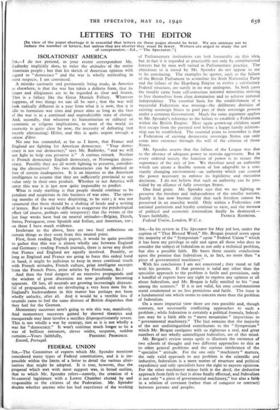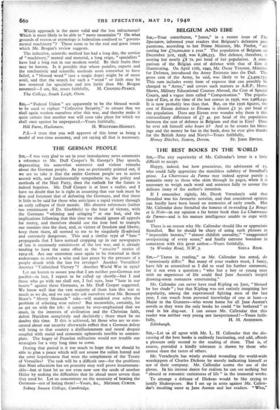Ste,—In his review in The Spectator for May 3rd last,
under the caption of "That Blessed Word," Mr. Brogan poured scorn upon the majority of the " Symposium " upon "Federal Union" which it has been my privilege to edit and upon all those who dare to consider the subject of federalism as not only a technical problem, but also a possible faith. He bases these caustic conclusions upon the premise that federalism is, in fact, no more than "a piece of governmental machinery."
With his conclusions I am not concerned ; they stand or fall with his premise. If that premise is valid any other than the specialist approach to the problem is futile and pernicious, only a handful of experts have any right to express any opinion at all about federalism, and Mr. Brogan is fully entitled to his "seat among the scorners." If it is not valid, his own condemnations stand condemned as no less pernicious and futile. The issue is a fundamental one which seems to concern more than the problem of federalism.
On a more impartial view there are two possible and, though contrary, not necessarily conflicting approaches to such a problem ; while federation is certainly a political formula, federal- ism may be a faith able to "move mountains" impervious to "governmental machinery." The fact remains that the majority of the not undistinguished contributors to the " Symposium " which Mr. Brogan castigates with so righteous a zeal, and great numbers of not wholly unintelligent federalists, are of this mind.
Mr. Brogan's review seems aptly to illustrate the existence of two schools of thought and. two different approaches to this as to other general problems and the curious intolerance of the " specialist " attitude. For the one only " machinery " matters, the only valid approach to any problem is the scientific and inductive, federalism is a mere matter of structure and political expediency and only specialists have the right to express opinions. For the other machinery minus faith is the devil, the deductive approach from faith to fact is alone finally effectual, and federalism is not only "a piece of governmental machinery," but also a faith in a relation of covenant (rather than of conquest or contract) between persons and peoples. Which approach is the more valid and the less infructuous? Which is more likely to be able to "move mountains "? On what grounds of reason or etymology is federalism confined to "govern- mental machinery "? These seem to be the real and great issues which Mr. Brogan's review suggests.
The inductive, scientific method has had a long day, the service of "machinery," mental and material, a long reign, " specialists " have had a long run in our modern world. By their fruits they may be known. Is it possible that where pundits, experts and the mechanistic and scientific methods seem somewhat to have failed, a "blessed word" (not a magic dope) might be of more avail, and that the search for such a " word " or faith may be less reserved for specialists and less futile than Mr. Brogan assumes?—I am, Sir, yours faithfully, M. CHANING-PEARCE. The College, South Leigh, Oxon.































 Previous page
Previous page